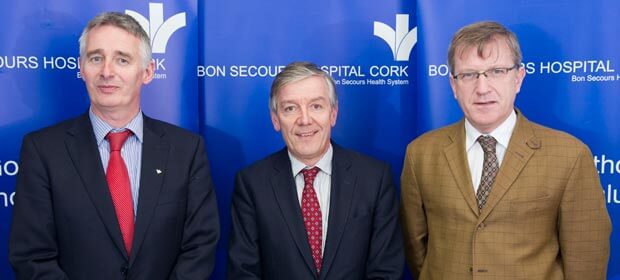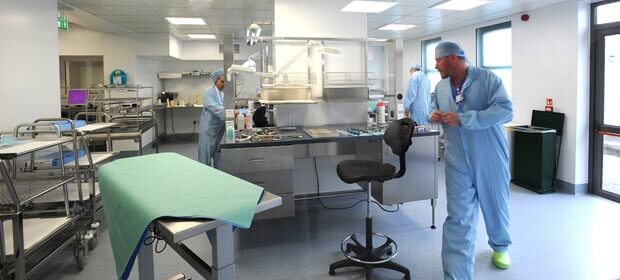- Bon Secours €4 million development
- €5 million Decontamination Unit for Cappagh
- Businessman Denis O’Brien takes over Beacon Hospital
- Institute of Successful Ageing
- HSE Mental Health Management Team
- HSE could miss cost savings target
- Paramedics support CPC
Bon Secours €4 million development
A new €4 million development providing an expansion of the Cardiac Catheterization laboratory supported by dedicated cardiology day capacity has been commissioned at the Bon Secours Hospital, Cork.

It provides coronary angiography, stenting, electrophysiology studies, pacemakers and intra cardiac devices/defibrillators.
The new build contains the most up-to-date diagnostic and interventional cardiology equipment which will greatly assist the Cardiology team members in their diagnosis and treatment of patients with heart problems. The department contains an extensive procedure room and twelve new patient bay areas.
Welcoming the new development Mr. Harry Canning, Hospital Manager said “a key priority for the hospital is to improve the facilities and environment for patients with a particular emphasis on high quality safe patient care, all enabled by highly trained staff and state of the art equipment.” Mr. Canning also paid tribute to the staff of the hospital in bringing this development to fruition.
Bon Secours Hospital Cork is an acute general hospital with 344 beds providing a range of inpatient and day case services to adults and children. The hospital employs 1,000 staff. The hospital has in excess of 70 consultants attending the hospital providing a broad range of clinical services and expertise. The hospital has a long tradition of cardiology services incorporating a Rapid Access Chest Pain Clinic, a Cardiology Department providing the full range of diagnostics (ECG, ECHO, Stress Testing etc), ICU and now a newly developed laboratory. The five consultant cardiologists – Drs Will Fennell, John Kenny, Conor O’Shea, Mahesh Pauriah and Carl Vaughan – are supported by a highly skilled cardiology team of technicians, nurses and others.
€5 million Decontamination Unit for Cappagh
A new €5 million Central Decontamination Unit has been officially opened at Cappagh National Orthopaedic Hospital.

The new unit is the first of its kind in Ireland and is capable of providing commercial decontamination services to the wider healthcare industry as well as to Cappagh Hospital itself.
The new unit is funded by the HSE, the Cappagh Hospital Foundation and Zehnacker Ireland Healthcare through a joint venture agreement.
It’s the latest development at the Finglas hospital which in recent years has completed a number of major developments including new theatres, a 10 bed isolation unit and the purchase of a hi-tech 3 Tesla MRI unit.
The new decontamination unit was constructed to be fully compliant with European standards, ISO standard 13485 and HSE standards for the decontamination of invasive medical devices that were introduced in 2011. That means all medical devices processed in the new unit are decontaminated to the most current Irish and European requirements.
The new unit is commercially managed by Zehnacker Ireland Healthcare to provide fully accredited, HSE and European standard compliant decontamination services to the Irish Healthcare Industry.
The unit was specifically developed to allow other healthcare facilities avail of the decontamination process, a concept which is common in most European healthcare settings.
Speaking at the official opening of the unit, John O’ Carroll, CEO of Zehnacker Ireland Healthcare said: “We see the practice of sharing state-of-the-art facilities between hospitals as the cornerstone for ensuring quality and achieving cost savings.”
Cappagh is the country’s national tertiary referral centre for both adult and children’s orthopaedics. A total of 24 consultant orthopaedic surgeons confer and work together to deliver a highly specialised and efficient service in the hospital.
The hospital manages a cohort of highly specific bone tumour cases, is a harvest centre and distributor of bone graft nationally and provides advanced rehabilitative services to patients from both the Mater hospital and Connolly hospital.
Cappagh also carries out elective orthopaedic surgery for six adult and children’s hospitals in the east including Beaumont Hospital, St James Hospital, Temple Street and St Vincent’s University Hospital
It’s a major teaching institution with undergraduate and postgraduate training facilities in medical, surgical anaesthetic and nursing programmes in conjunction with the Royal College of Surgeons in Ireland, University College Dublin and Dublin City University.
It has 157 beds for adults and children. On average it carries out approximately 3,000 major patient operations, 8,000 minor operations and 12,000 out-patient reviews annually.
Businessman Denis O’Brien takes over Beacon Hospital
Billionaire businessman Denis O’Brien is to take over the 214 bed Beacon Private Hospital in Dublin.

This follows the decision of Ulster Bank/Royal Bank of Scotland (RBS) to sell around €100 million in debts associated with the major private hospital to Mr. O’Brien.
The hospital, which employs 600 staff and 200 medical consultants, was previously owned and operated by the University of Pittsburgh Medical Centre, an American private hospital operator.
UPMC divested its ownership and relinquished all management responsibilities at the hospital from the middle of this month.
UPMC said that over the previous 15 months, Beacon had been in discussion with Ulster Bank and RBS to restructure the hospital’s outstanding bank debt resulting from the building of the facility in 2006.
“A generous offer was made, but ultimately Ulster Bank/RBS elected to sell the Beacon Hospital debt to Irish businessman Denis O’Brien,” UPMC said.
UPMC has been associated with Beacon since 2008. It also owns a cancer centre in Waterford, which is unaffected by the takeover of the Beacon.
Institute of Successful Ageing
The HSE is to provide €31.7 million for a new facility for the Mercer’s Institute of Successful Ageing (MIRA) at St. James’s Hospital, Dublin.
The new facility will explore novel approaches to health care of older people and it will establish a range of rapid access ambulatory clinics according to the Trinity College School of Medicine to which the Institute will be aligned.
It will use modern information technology systems to promote wellness and independent living in the community. It will provide leadership in gerontology at both national and international levels.
HSE Mental Health Management Team

All members of the HSE Mental Health Management Team are now in place.
The six members of the Management Team are Mr. Stephen Mulvany, HSE National Director of Mental Health, Mr. Paddy McGowan, Interim Head of Service Users, fFamily and Carer Engagement, Dr. Margot Wrigley, HSE National Clinical Adviser and Clinical Programme Group Lead for Mental Health, Ms. Yvonne O’Neill, Head of Planning, Performance and Programme Management, Ms. Ann O’Connor , Head of Operations and Service Improvement and Mr. Martin Rogan, Head of Quality , Patient Safety, Standards and Compliance.
HSE could miss cost savings target
The HSE could miss its target for costs savings this year by €170 million and up to €228 million in a worst case scenario, according to a report to the Government by PA Consulting.
It said that a growing reliance on agency staff, the ageing of the population and the reduction in private health coverage were all factors driving up costs in the HSE. There had been a “marked increase” in agency spend in the medical and dental category, which might be due to changed working conditions for junior doctors
The PA report says that reductions in staff numbers are affecting the ability to maintain services and control costs. Short staffing and continuing attempts to control employment numbers may be contributing to higher rates of absenteeism and staff leaving to work elsewhere, it suggests.
The report points out that the health service is required to reduce its workforce to 98,000 this year, a drop of 2,600, but when account is taken of 500 new posts being filled, the effective reduction in frontline staff is 3,100. This comes on top of a 12,500 reduction in staff numbers since 2007.
In the meantime, it is understood that a report prepared by the HSE for Health Minister, Dr. James Reilly, which shows that, based on the amount of cash spent in the first two months, the HSE could be facing a €532 million cash shortfall this year.
However, HSE Chief Financial Officer, Mr. Tom Byrne has been reported as saying that he does not believe this reflects the position the HSE will be in at the end of the year.
Paramedics support CPC
Irish Paramedics and Advanced Paramedics (APs) are supportive of Continuous Professional Competence (CPC) linked with their professional development and registration, according to a new national study from the University of Limerick.
The study carried out by Prof. Colum Dunne, Shane Knox and Walter Cullen showed that blended learning, involving evidence of patient contact, team-based learning and practical skills were preferred CPC activities.
With the imminent introduction of a CPC framework for paramedics and advanced paramedics (APs) in Ireland, the study aimed to identify factors that would inform the implementation of this CPC framework by seeking stakeholder input into the development of a CPC model for use by the regulatory body. Their secondary objective was to determine the attitudes of registrants towards CPC and what they considered as optimal educational outcomes and activities, for the purposes of CPC.
All paramedics and APs registered in Ireland were invited by email to complete an anonymous on-line survey. The overall response rate was 43 per cent, with 82 per cent of APs and 38 per cent of paramedics participating.
Eighty-nine per cent agreed that registration was of personal importance, 74 per cent agreed that evidence of CPC should be maintained and 39 per cent believed that persistent failure to meet CPC requirements should mandate denial of registration.
From a pre-determined list of activities, respondents indicated practical training scenarios (94 per cent), cardiac re-certification (92 per cent), e-learning supplemented by related practice (92 per cent) and training with simulation manikins (88 per cent) were most relevant, while e-learning alone (36 per cent), project work (27 per cent) and reading journal articles (24 per cent) were considered least relevant.

